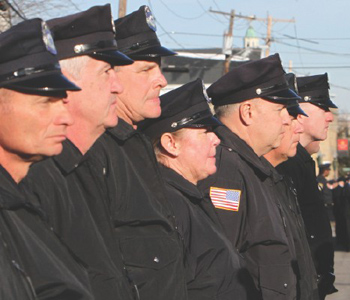
Woburn police officers stand outside the McLaughlin-Dello Russo Funeral Home in Woburn during the wake yesterday for slain Officer John "Jack" Maguire. Video and slide show at lowellsun.com. (SUN / JULIA MALAKIE)
BOSTON -- As thousands of law-enforcement officers from across the state remembered slain Woburn police Officer John "Jack" Maguire at his wake yesterday, the Middlesex District Attorney's Office said it was never notified that Maguire's accused killer was up for parole last year.
The state Parole Board is under fire for releasing in February 2009 career criminal Dominic Cinelli, who was serving three concurrent life sentences.
In 2005, the Parole Board had noted that Cinelli was "in need of a long period of positive adjustment and programming that adequately addresses the causative factors of his criminal behavior."
Yet three years later, the board granted him parole, saying, "Overall, Mr. Cinelli has been proactive in addressing the board's previous concerns, and has exhibited a strong motivation to achieve his rehabilitative goals," according to the November 2008 report. "He appears committed to conducting his life in a positive manner. He has not accrued any disciplinary reports or returns to higher custody since 1999. Moreover, his proactive participation in programs aimed at reducing his risk to recidivate is viewed positively by the board."
The day after Christmas, Cinelli, 57 -- who entered the prison system in 1976 and had received three life sentences -- was shot and killed in an exchange of gunfire with Maguire, 60, who was also killed, during a botched jewelry robbery at the Kohl's store in Woburn.

Woburn police Officer John "Jack" Maguire ... killed in shooting Sunday.
The outcry from law enforcement to the Parole Board's decision to release Cinelli prompted the state Department of Public Safety to order a review of the Parole Board decision and provide the governor with a comprehensive report within 10 days.
"Our comprehensive review of Dominic Cinelli's parole is ongoing and is expected to be completed in the next 10 days," said John Grossman, undersecretary of the Executive Office of Public Safety and Security. "It is a thorough review of the hearing process and his conduct under supervision."
Grossman said a preliminary review shows the Suffolk County District Attorney's Office was notified, but the Middlesex DA's office was not. Cinelli was in prison for crimes that spanned the two jurisdictions.
"A component of the Parole Board's review will be to identify a system that will assure that appropriate notifications are made in every case without fail,'' Grossman wrote.
Massachusetts law requires that the Parole Board notify prosecutors of hearings that involve inmates serving life sentences. The DA's office said the Parole Board does not routinely notify prosecutors of hearings unless they involved convicted murderers.

Dominic Cinelli ... was released in February 2009.
Inmates convicted of second-degree murder have the possibility of parole after serving 15 years, but Cinelli qualified for a hearing because of his concurrent life sentences as a habitual armed robber.
The Parole Board's 6-0 vote in 2008 freed Cinelli. Three years earlier, the DA's office opposed Cinelli's 2005 bid for parole through a strongly worded letter sent to the Parole Board. In the letter, then-Assistant District Attorney Lynn Rooney, now a district court judge, wrote that Cinelli fed his long-standing drug addiction through armed robberies.
Due to "the uncertainty that he has overcome his addictions and is fully prepared for difficulties of life outside of prison walls, this office opposes the parole of Mr. Cinelli,'' Rooney wrote.
Rooney notes that Cinelli's time behind bars included more than 50 disciplinary reports and two escapes. During his first stretch in prison, between 1976 and 1985, Cinelli incurred 40 disciplinary reports and was moved to a higher security tier.
By 1985, with improving behavior, Cinelli was granted furloughs. He completed four furloughs, but failed to return on his fifth. He was on the run for two months. He was convicted 10 months later of additional armed robberies he committed during that escape.
After this conviction, Cinelli escaped again. Eleven days after his second escape, he was returned to custody facing additional criminal charges. He also did 4 1/2 years locked up in Rhode Island.
Cinelli's disciplinary report while in prison spans his 30 years behind bars. Cinelli's program participation in his first 20 years in prison was "extremely limited,'' Rooney wrote.

An estimated 2,000 police officers from across New England attended the wake for Officer John "Jack" Maguire, a Wilmington resident. (SUN / JULIA MALAKIE)
"Mr. Cinelli has not utilized his time in prison well, spending nearly 25 of those years using drugs, being violent towards other, disrespecting authority, and participating minimally in programming,'' Rooney wrote.
In a videotape of his November 2008 parole hearing, Cinelli told the board, "I'm new and different. ... But I realize that deep inside me there is still that ugliness, and I know I have to deal with that and control that, and I'm doing a real good job of it.''
Cinelli had an extensive history of substance abuse, beginning in grade school with marijuana and barbiturates. By the age of 15, the son of a Boston police officer was using heroin daily, police said. Cinelli claimed that much of his criminal activity was to support his drug addiction, and the Parole Board noted that "much of his negative institutional behavior" stemmed from drug abuse.
In their decision to grant parole, the board -- Mark Conrad, Doris Dottridge, Candace Kochin, Pamela Lombardini, Thomas F. Merigan Jr. and Leticia Munoz -- concurred that Cinelli's release "would not be incompatible with the welfare of society."
Cinelli, they noted, had completed an anti-violence course, participated in Toast Masters and church services, and attended 12-step and drug-abuse programs. He also completed his GED, including learning Microsoft 1997, they noted.
"Mr. Cinelli has strong family support, and has a solid transition plan. Family members attended his hearing and spoke about the support they would provide him upon his release."
By February 2009, Cinelli was a free man.
Tyngsboro Police Chief William Mulligan noted Cinelli "explained that he is better behaved, but that's in prison. ... This was a man with a history of a violent past, serving three life sentences. The Parole Board should have looked at the totality of the situation."
Sen. Scott Brown said yesterday that Maguire's death could have been prevented.
"The fact that you have a violent offender, who was violent in and out of prison and was released, you know, it seems there's a breakdown, and I think heads should roll," Brown said yesterday.











